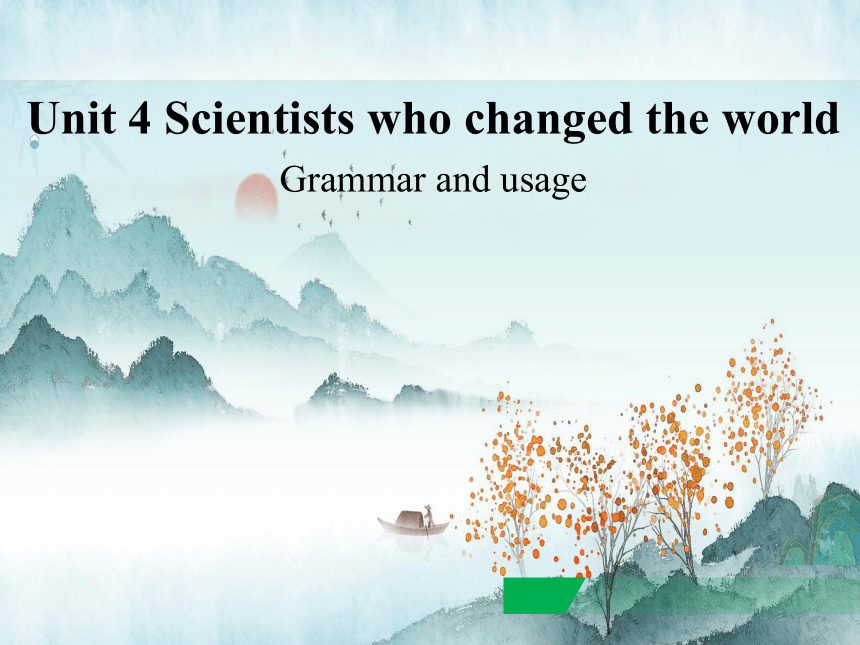(
课件网) Unit 4 Scientists who changed the world Grammar and usage Verb-ed forms as attributives, adverbials and object complements Grammar and usage 1. Tu Youyou has become the first female scientist of the People’s Republic of China to receive a Nobel Prize, awarded for her contribution to the fight against malaria, one of the deadliest diseases in human history. 2. To speed up the process and ensure its safety, Tu and her team volunteered to test qinghao extract on themselves first. to-infinitive as attributive to-infinitive as adverbial of purpose Find to-infinitives and figure out their functions. Lead-in 1. She completed further training courses in traditional Chinese medicine, acquiring a broad knowledge of both traditional Chinese medicine and Western medicine. 2. When there was no research equipment, they had to extract herbs using household water containers. 3. Perhaps the next generation of scientists, drawing on the wisdom of traditional Chinese medicine, will indeed discover more medicines beneficial to global health care. verb-ing forms as adverbials Lead-in Find verb-ing forms and figure out their functions. 1.Tu Youyou has become the first female scientist of the People’s Republic of China to receive a Nobel Prize, awarded for her contribution to the fight against malaria, one of the deadliest diseases in human history. 2. Thanks to her discovery of qinghaosu, malaria patients all over the world now have had a greatly increased chance of survival. 3. Even with large amounts of qinghao extract produced, however, they still faced another problem. verb-ed forms as attributives Lead-in Find verb-ed forms and figure out their functions. 4. Born in 1930, in Ningbo, Zhejiang Province, Tu studied medicine at university in Beijing between 1951 and 1955. 5. Inspired by an over 1,600-year-old text about preparing qinghao extract with cold water, Tu redesigned the experiments. verb-ed forms as adverbials Lead-in Find verb-ed forms and figure out their functions. Why in the above five sentences verb-ed forms are used rather than verb-ing forms Exploring the rules The verb-ed form can be used like an adjective or an adverb, indicating a(n) (1) _____(active/passive) meaning. passive Rule 1 Exploring the rules Verb-ed forms as attributives something produced by the mould Verb-ed forms as adverbials Verb-ed forms as object complements the prepared mind surprised by this get its mass production started Exploring the rules Henry is reading a science magazine article about a world-changing discovery. Find the verb-ed forms in the article and fill in the table below. The first has been done for you. The verb-ed form can appear before or after a noun or pronoun. It modifies the noun or pronoun like a(n) (2)_____ (relative clause/adverbial clause). relative clause Rule 2 Rule 3 The verb-ed form can be used as an adverbial or an object complement. Exploring the rules Verb-ed forms as attributives ... ...

